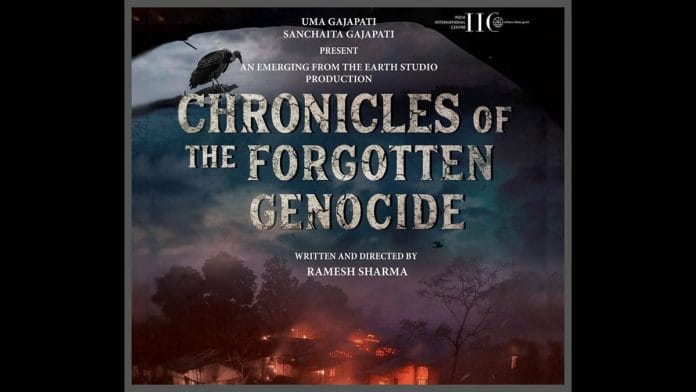While making his 2025 documentary Chronicles of the Forgotten Genocide, filmmaker Ramesh Sharma turned to AI to recreate a turbulent and bloody period of Bangladesh’s history. The film traces the 1971 ethnic cleansing and genocide, the millions of refugees fleeing to India, America’s role in the bloodshed, the Liberation War and, later, the 1975 assassination of Sheikh Mujibur Rahman, the country’s former president and prime minister.
“A lot of archival footage from the Bangladesh Liberation War was erased after Mujibur Rahman’s death. We had to depend on AI for some of the scenes,” said Sharma after the screening of his film at the CD Deshmukh Auditorium, India International Centre, on 28 August.
Thirty years after Mujibur Rahman was killed in a military coup, Chronicles of the Forgotten Genocide raises searing questions about America’s role in those turbulent years. US President Richard Nixon and his national security advisor Henry Kissinger backed Pakistan even as American diplomats in Dhaka sent regular missives about the atrocities and horror of the genocide. The film is both a reminder and a critique of US complicity in these events.
The film was partly shot in the US and Bangladesh, and it took around two years for the filmmaker and his research team to gather all the information and visual material. Most of the film is in black and white, including the AI-generated recreations, with colour used only in interviews and a few present-day sequences.
Sharma does not attempt to tone down the violence. The audience gasped at the heart-wrenching visuals of dead bodies, the accounts of survivors, and the recreation of some of the bloodiest moments in this dark chapter in the subcontinent’s history.
He calls Nixon and Kissinger the “poster boys of genocide”.
“These two are war criminals. If they had not been there, there would have been no genocide,” Sharma told ThePrint. “They are complicit in the Bangladesh killings.”
Also Read: Sheikh Mujib failed miserably despite succeeding as people’s leader, says author Manash Ghosh
‘America is above the laws’
Sharma doesn’t shy away from asking tough questions or dealing with the subsequent fallout.
“I do not give a damn, I might not get a US visa ever in this life,” he said.
His earlier work includes New Delhi Times (1986), a thriller on political corruption and the media starring Sharmila Tagore, Shashi Kapoor, and Om Puri; it won three National Film Awards. He also co-directed the documentary The Journalist and The Jihadi: The Murder of Daniel Pearl, released in 2006 and nominated for two Emmys in 2007.
In Chronicles of the Forgotten Genocide, Sharma combines music, lyrics, photos, and videos to convey his point of view. The film ends with a song, ‘America is above the laws’, playing over visuals of refugees from around the world, including Gaza.
The IIC screening was the movie’s first, and Sharma said it still needs more work.
“The film is still in progress, we will polish it more,” he added.
Also Read: Is Bangladesh secular?’ 1971 war documentary draws questions over ‘missing’ Hindu massacre
‘Truth about Kissinger’
More than 200 people gathered at IIC to watch the film. There was no panel discussion after the screening, but that didn’t stop students, history enthusiasts, and writers from surrounding Sharma and praising his cinematography and research.
“This movie was informative. I will research more about it when I go back home. I was impressed by how the director showed the reality of America, the hegemony exercised by them,” said 19-year-old Delhi University student Sristi Karmakar.
Retired Commodore Ranjit B Rai, who had experienced the 1971 War, declared that it was an excellent production. He even recounted his brief encounter with Kissinger back in 1974.
“Kissinger was an angry man. The truth of his hatred for Indians is coming out. Everyone always thought it was Nixon. The movie brings out Kissinger’s truth,” Rai said.
(Edited by Asavari Singh)






